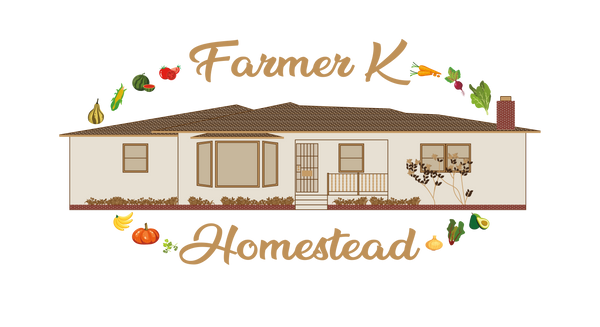
Transforming "Imperfect" Produce into Culinary Delights: A Guide to Reducing Food Waste
Share
In a world where the aesthetic appeal of food often determines its fate, the battle against food waste is more crucial than ever. Here at Farmer K Homestead, we've embraced the beauty of the "imperfect" – those fruits and vegetables that might not make it to the supermarket shelves due to their looks but are perfect in flavor and nutrition. Let's explore how you can turn these overlooked gems into delicious meals and reduce your food waste footprint.
The Problem of Imperfect Produce
Every year, a significant amount of food is discarded simply because it doesn't meet the stringent cosmetic standards of retail markets. This includes fruits and vegetables that are slightly bruised, oddly shaped, or not uniformly colored. However, these imperfections do not affect the taste or nutritional value, making their disposal a waste of potential.
Turning Waste into Wonders
1. Apple Butter from "Number 2 Apples":
At Farmer K Homestead, we've learned that "number 2 apples" – those with minor flaws – are ideal for making apple butter. Here's how:
- Gather Your Ingredients: Slightly bruised or misshapen apples, cinnamon, sugar, and lemon juice.
- Method: Core and chop the apples, cook them down with water, then blend with spices. Simmer until it thickens into a spreadable consistency. This butter not only tastes divine but lasts longer than fresh apples, giving you weeks of enjoyment or the chance to gift homemade treats.
2. Strawberry Jam from Imperfect Strawberries:
We source directly from local farmers slightly imperfect strawberries and process them to find new life in our delicious Fruit Bites or our homemade strawberry jam, saving them from becoming wasted foods. Here's how you can make your own jam:
- Ingredients: Strawberries with minor blemishes, sugar, pectin, and lemon juice.
- Process: Hull and mash the strawberries, combine with sugar and lemon juice, then cook with pectin until it jells. This jam is perfect for spreading on toast, filling pastries, or even as a topping for desserts.
Beyond Jam and Butter
- Vegetable Stocks: Use limp vegetables or those with minor blemishes for homemade stocks. They're ideal for soups, risottos, or as a base for cooking grains.
- Smoothies and Juices: Overripe or slightly bruised fruits are perfect for blending into smoothies or juicing, capturing their full nutritional benefits.
- Pickling: Odd-shaped cucumbers or peppers can be pickled, enhancing their flavor and extending their shelf life.
The Impact of Using Imperfect Produce
By transforming what would be waste into culinary delights, we not only save money but also reduce our environmental impact:
- Reduce Landfill Waste: Less food waste means less methane gas from decomposing food in landfills.
- Conserve Resources: Growing food uses water, land, and energy. Using all of it is a step towards sustainability.
- Support Local Farmers: Buying or using "second-grade" produce supports local agriculture, helping small farms thrive by giving value to all their harvest.
Conclusion
At Farmer K Homestead, we've embraced the philosophy that beauty is in the taste, not just the appearance. By making "number 2 apples" into delicious apple butters and slightly imperfect strawberries into our Fruit Bites or homemade strawberry jam, we've not only created something delicious but also contributed to a more sustainable food system. Next time you encounter imperfect produce, consider the possibilities – from apple butter to strawberry jams, every piece of food has the potential to delight. Let's change our perspective on food waste, one imperfect fruit at a time.

